Commercial Linux Games
Commercial Linux Games
When Loki Software, Inc., closed its doors a few years ago, the landscape of commercial gaming in Linux changed. Loki produced Linux ports of popular games, including Myth II and Civilization: Call to Power, to name a few, and many hoped it would help Linux become the premier gaming platform. Today, commercial games that run natively are led by several popular games from id Software (described in the next section).
Although Loki Software, Inc. is gone, certain Loki Games are still available for purchase on the Web. Although they sell for a fraction of their original price, you are on your own if they don't work since Loki Software is no longer there to support them. The Loki Games Demo is still around, if you want to get a feel for a particular Loki game before it disappears completely (I describe how to find demo and packaged Loki Games later in this chapter).
In the wake of Loki's demise, TransGaming Technologies has been working on an approach to bringing popular games to Linux that relies on a version of WINE called Cedega (formerly WineX ). In most cases, instead of having different ports of popular games (as Loki did), Transgaming lets users run existing Windows games in Linux by adapting Cedega to each game that needs a tweak here and there.
While the state of Linux gaming has improved somewhat since earlier editions of this book, Linux is still emerging as a gaming platform. Linux has some of the technology needed to support advanced games, but the technology and developer support have not yet really come together.
Most serious gamers still maintain a Windows partition to support their gaming habits. According to top game developers, there are significant hurdles - both technological and economic - that hinder development of games for Linux. In particular, the relatively small size of the Linux gaming market means that incentives to overcome the technical issues are not particularly strong. However, these limitations are not overwhelming. As you'll see later in this chapter, even the hardcore game nut can successfully use Linux.
Getting Started with Commercial Games in Linux
How you get started with Linux gaming depends on how serious you are about it. If all you want to do is play a few games to pass the time, I've already described plenty of diverting X Window games that come with Linux. If you want to play more powerful commercial games, you can choose from:
-
Games for Microsoft Windows (Cedega 5.2.3)- Many of the most popular commercial games created to run on Microsoft operating systems will run in Linux using Cedega. To get RPM versions of Cedega, you must sign up for a Cedega subscription at www.transgaming.com . Make sure to check in with www.linuxgames.com to see if there is a relevant HOWTO for working with the particular game you have in mind. Many games are covered there, including Half-Life and Unreal Tournament . To see if your favorite Windows game will run in Linux and Cedega, refer to the TransGaming.Org Games Database at http://transgaming.org/gamesdb .
-
Games for Linux (id Software and others)- Certain popular games have Linux versions available. Most notably, id Software offers its DOOM and Return to Castle Wolfenstein in Linux versions. Other popular games that run natively in Linux include Unreal Tournament 2004 and 2005 from Atari ( www.unrealtournament.com ). Commercial games that run in Linux without WINE, Cedega, or some sort of Windows emulation typically come in a boxed version for Windows with some sort of Linux installer included.
Linux games that were ported directly to Linux from the now defunct company Loki Software, Inc. are still available. While you cannot purchase the titles directly from Loki, you can go online to one of Loki's resellers at www.lokigames.com/orders/resellers.php3 . For example, Amazon.com (one of the listed resellers) shows 16 titles including Quake III, Myth II: Soulblighter, and Heretic II for Linux.
Playing Commercial Linux Games
To get your commercial games running in Linux, you should start from a site such as the Linux Game Tome ( www.happypenguin.org ) or Linux Gamers' FAQ ( http://icculus.org/lgfaq ), which both provide information on commercial games that run in Linux and help in getting them to run. In most cases, you need to:
-
Purchase a legal copy of the game.
-
Go to a Web site that describes how to install, get patches for, and work around any issues related to playing the game in Linux.
Here are examples of a few commercial games that run well in Linux:
-
Duke 3D Atomic Edition for Linux (3D Realms)- Duke Nukem returns to earth to face aliens and clean up Los Angeles in this third chapter in the Duke Nukem series. Visit 3D Realms for official information about Duke 3D Atomic Edition ( www.3drealms.com/duke3d ). Visit http://icculus.org/duke3d for tips on getting it running.
-
Unreal Tournament 2003 (Epic Games)- Multiplayer death match set in the future, where warriors face each other with awesome weapons and stuff. Includes a Linux installer. Go to Epic Games ( www.epicgames.com ) or the Unreal Tournament site ( www.unrealtournament.com ) for the official information. Visit the Icculus.org site for tips on installing in Linux ( www.icculus.org/lgfaq#ut2k3_install ).
-
Unreal Tournament 2004 (Epic Games)- Adds new maps, characters , vehicles, weapons, and modes of play to the 2003 edition.
The following sections describe Linux games from id Software, information about running Windows games using Cedega in Linux, and games produced by Loki Games (before it went out of business) still available from other sources today.
id Software Games
Among the most popular games running natively in Linux are Quake III Arena, and Return to Castle Wolfenstein from id Software, Inc. You can purchase Linux versions of these games or download demos of each game before you buy.
| Note | If you have trouble getting any id Software games running in Linux, refer to the Linux FAQs available from id Software at: http://zerowing.idsoftware.com/linux . |
Quake III Arena
Quake III Arena is a first-person shooter-type game where you can choose from lots of weapons (lightning guns, shotguns, grenade launchers , and so on) and pass through scenes with highly detailed 3D surfaces. You can play alone or against your friends . There are multiplayer death-match and capture-the-flag competitions. Standalone play allows you to advance through a tournament structure of skilled AI opponents. This version of the game lets you select a difficulty level, from fairly easy to downright impossible .
A demo version of Quake III Arena for Linux is available from the id Software Web site (find the demo link at www.idsoftware.com/games/quake/quake3-gold/ and look for the Linux demo). Because the demo is in the form of a large shell script, to save it you can right-click the link and select Save Link As from your Web browser. Figure 7-5 shows a screenshot from Quake III Arena.
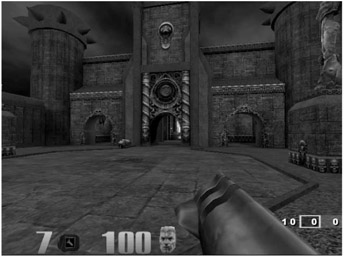
Figure 7-5: Quake III Arena is a popular first-person shooter game that runs in Linux.
Return to Castle Wolfenstein
Mixing World War II action with creatures conjured up by Nazi scientists, you battle with the Allies to destroy the Third Reich. Return to Castle Wolfenstein is based on the Quake III Arena engine. The game offers single-player mode as well as team-based multiplayer mode.
If you purchase Return to Castle Wolfenstein for Linux, you actually get the Windows version with an extra Linux installer. If you already have the Windows version, you can download the Linux installer and follow some instructions to get it going. I downloaded the installer wolf- linux-1.41b.x86.run from ftp.idsoftware.com/idstuff/wolf/linux . The INSTALL file (in /usr/local/games/wolfenstein ) describes what files you need to copy from the Windows CD. You can buy the Linux installer from www.tuxgames.com .
To get a demo of Return to Castle Wolfenstein, go to www.idsoftware.com/games/wolfenstein/rtcw/index.php?game_section=overview . Both a single-player and a multiplayer demo are available.
| Note | You need an NVIDIA card to run Return to Castle Wolfenstein. |
Figure 7-6 is a screenshot from Return to Castle Wolfenstein running in Linux.
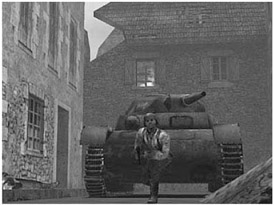
Figure 7-6: Return to Castle Wolfenstein combines strange creatures and WWII battles .
Gaming with Cedega
TransGaming Technologies ( www.transgaming.com ) brings to Linux some of the most popular games that currently run on the Windows platforms. Working with WINE developers, TransGaming is developing Cedega, which enables you to run many different games on Linux that were originally developed for Windows. Although TransGaming is producing a few games that are packaged separately and tuned for Linux, in most cases it sells you a subscription service to Cedega instead of the games. That subscription service lets you stay up-to-date on the continuing development of Cedega so you can run more and more Windows games.
| Note | You may need to obtain a vanilla kernel from kernel.org and boot that on your system before running games with Cedega. |
To get Windows games to run in Linux, Cedega particularly needs to develop Microsoft DirectX features that are required by many of today's games. There are also issues relating to CD keys and hooks into the Windows operating system that must be overcome (such as requiring Microsoft Active Desktop). In fact, a Cedega subscription has value, in part, because it lets you vote on which games you'd like to see TransGaming work on next.
A full list of games supported by TransGaming, as well as indications of how popular they are and how well they work, is available from the TransGaming.org site ( www.transgaming.org/gamesdb ). Browse games by category or alphabetically . Games that are officially supported by Transgaming are marked by an asterisk. On each game description page is a link to a related Wiki Node, when one exists, that gives you details about how well the game works under Cedega and tips for getting it to work better.
TransGaming added several new features to the Cedega GUI (formerly called Point2Play). The Cedega GUI provides a graphical window for installing, configuring, and testing Cedega on your computer. It also lets you install and organize your games so you can launch them graphically. Figure 7-7 shows an example of the Cedega GUI window in Linux.
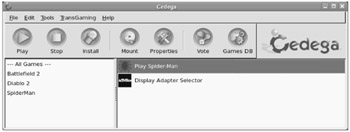
Figure 7-7: Use the Cedega GUI window to check computer hardware for Cedega gaming.
Features in the new Cedega GUI window include a new look-and-feel and tools for individually configuring how each game runs under Cedega. (If a game won't run from the GUI, try launching it from a Terminal window.)
You can download a free 14-day trial of Cedega that is fully functional for that limited time. To get the full benefits of Cedega, you need to subscribe to TransGaming. For details on how to become a "TransGamer," click the Subscribe Here link on the TransGaming home page ( www.transgaming.com ). Benefits currently include:
-
Downloads of the latest version of Cedega
-
Access to Cedega support forums
-
Ability to vote on which games you want TransGaming to support next
-
Subscription to the Cedega newsletter
Cedega used to be known as WineX. The source code for WineX may become available in the near future if you want to build your own WineX/Cedega package. To check availability, try the SourceForge .net project site for WineX ( sourceforge.net/projects/winex ).
Loki Software Game Demos
To encourage people to get to know its games, Loki offered a demo program that lets you choose from among more than a dozen Loki games to download and try. Loki also offered boxed sets of its commercial games for purchase. Although Loki Software, Inc. is no longer in business, you can still find some of its games for sale. For example, a recent search for Loki at Amazon.com turned up 16 different Loki games (including the ones described here), with many selling for $9.99.
| Warning | If you try to download any of the demos described in the next sections, make sure you have plenty of disk space available and a fast connection. It is common for one of these demos to require several hundred megabytes of disk space. |
The Loki Demo Launcher for downloading demos is still available from the Demo Launcher page ( www.lokigames.com/products/demos.php3 ). From that page, there are links to FTP sites from which you can download the Demo Launcher. The file that you want to save is loki_demos-full-1.0e-x86.run . Save it to a directory (such as /tmp/loki ) and do the following:
-
Change to the directory where you downloaded the demo. For example:
# cd /tmp/loki
Note You may not need to be root user to install these games. However, the default paths where the Demo Launcher tries to write by default are only accessible to the root user.
-
As root user, run the following command (the program may have a different name if it has been updated):
# sh loki_demos-full-1.0e.x86.run
If you have not used the Demo Launcher before, you are asked to identify the paths used to place the Install Tool.
-
If the default locations shown are okay with you, press Enter (or add a different path if you need to assign a location with more disk space). You will then be asked to identify other locations for Uninstall and Demo files.
When all locations are defined, the Loki Update Tool window appears.
-
Select the Demos you want to install (hover your cursor over each demo line to see how much disk space each requires) and select Continue. A download window appears.
-
Choose a mirror site from which to download the demo. Each selected demo or upgrade is downloaded.
-
When the download is completed, select Finished. The window will close.
-
Back at the command prompt, press Enter to begin playing the game.
-
Select to start the game, and you're ready to go.
The following sections describe a few games that may still be available. Again, these games may not be available for long.
Civilization: Call to Power
You can build online civilizations with Civilization: Call to Power (CCP). Like earlier versions and public spin-offs (such as the Freeciv described earlier in this chapter), Civilization: Call to Power for Linux lets you explore the world, build cities, and manage your empire. This latest version offers multiplayer network competition and extensions that let you extend cities into outer space and under the sea.
If you like Freeciv, you will love CCP. Engaging game play is improved with enhanced graphics, sound, and animation. English, French, German, Italian, and Spanish versions are available.
The CCP demo comes with an excellent tutorial to get you started. If you have never played a civilization game before, the tutorial is a great way to start. Figure 7-8 shows an example of a scene from the Civilization: Call to Power for Linux demo.
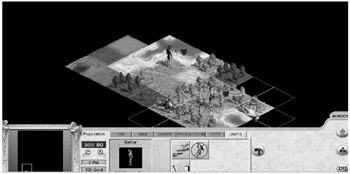
Figure 7-8: Civilization-Call to Power features excellent graphics and network play.
Myth II: Soulblighter
If you like knights and dwarves and storming castles , Myth II: Soulblighter for Linux might be for you. In Myth II, you are given a mission and some troops with various skills. From there, you need strategy and the desire to shed lots of virtual blood to meet your goal.
Myth II was created by Bungie Software ( www.bungie.net ) and ported to Linux by Loki Entertainment Software ( www.lokigames.com ). This version of the popular Myth game includes improved graphics and new scenarios.
A demo version is available that runs well in Fedora and RHEL. You can get it via the Demo Launcher described earlier. As usual, you will need computer that is at least a Pentium 133 MHz, with 32MB RAM, 80MB swap space, and 100MB of free disk space. You need network hardware for multiuser network play (network card or dialup) and a sound card if you want audio. A screenshot of Myth II is shown in Figure 7-9.
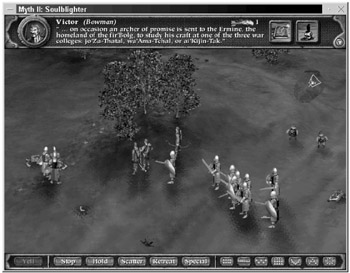
Figure 7-9: Use warriors, archers, and dwarves to battle in Myth II.
Heretic II
Based on the Quake Engine, Heretic II sets you on a path to rid the world of a deadly , magical plague. As the main character, Corvus, you explore dungeons, swamps, and cities to uncover and stop the plague. The graphics are rich and the game play is quite engaging.
You will experience some crashing problems with Heretic II out-of-the-box. Be sure to check for the update to Heretic II at updates.lokigames.com , which should fix most of the problems.
Neverwinter Nights
BioWare ( www.bioware.com ) dipped its foot into Linux gaming waters with a Linux client for its wildly popular Neverwinter Nights game. Neverwinter Nights is a classic role-playing game in the swords-and-sorcery mold. You can develop your character and go adventuring, or play online with others via a LAN or over the Internet. You can even build your own worlds and host adventures as the Dungeon Master. Neverwinter Nights is licensed by Wizards of the Coast to use Dungeons & Dragons rules and material.
In order to use the Neverwinter Nights Linux client, you must purchase the game itself from BioWare. You must also have access to certain files from a Windows installation of the game. If you or a friend have the Windows version already, you can grab the files from that version. Otherwise, you'll find them online in a number of locations. See the installation instructions at http://nwn.bioware.com for links.
EAN: 2147483647
Pages: 279